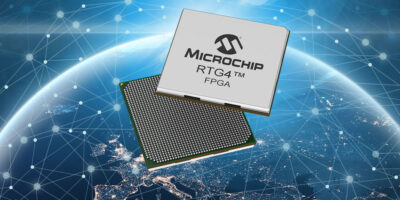RTG4 Sub-QML is claimed to be first rad-tolerant FPGA in a plastic package
Microchip’s RTG4 Sub-QML FPGA has been qualified to JEDEC standards in a flip-chip 1657 ball grid array plastic package, with 1.0mm ball pitch. The low-power RTG4 FPGA offers new space system designers the industry’s highest reliability at lowest cost with shortest lead times, says Microchip Technology.
The radiation tolerant (RT) FPGA offers developers of small-satellite constellations and other systems used in new space missions the low cost of a JEDEC-qualified plastic package with the reliability of RTG4 FPGA technology and decades of spaceflight heritage, eliminating full Qualified Manufacturers List (QML) procedures.
“This is a major milestone for system designers who need large volumes of space-grade components at low unit cost, and reduced lead times so they can keep pace with shorter service launch cycles,” said Ken O’Neill, associate director, space and aviation marketing for Microchip’s FPGA business unit.
The RTG4 Sub-QML FPGA is pin-compatible with the company’s QML Class V-qualified RTG4 FPGAs in ceramic packages, making it easy for developers to migrate their designs between new space and more rigorous Class-1 missions. The RTG4 Sub-QML FPGAs in plastic packages are also available as prototypes in small quantities, allowing designers to evaluate the product and prototype their systems before committing to large volumes of flight models.
Other Microchip products available in plastic packages for spaceflight systems include its LX7730 telemetry controllers, LX7720 position sensing and motor controllers, and high-reliability plastic versions of its microcontrollers, microprocessors, Ethernet PHYs, ADCs, EEPROM and flash and memory.
The JEDEC-qualified RTG4 Sub-QML FPGA in the 1657 ball plastic BGA package is available in production volumes.
Microchip Technology offers development tools and a comprehensive product portfolio and serves more than 120,000 customers across the industrial, automotive, consumer, aerospace and defence, communications and computing markets.




